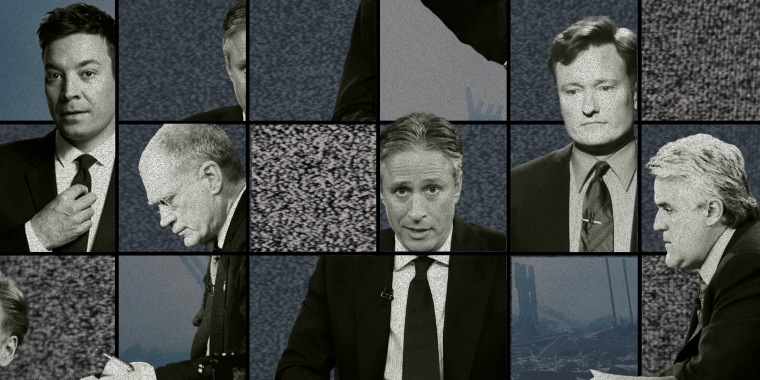Comedy and current events have historically intersected on late-night television, but the laughs came to a screeching halt after the Sept. 11 terrorist attacks, putting the programs and their hosts in an unfamiliar position. While humor was not something Americans necessarily sought in such a turbulent time, these shows became a de facto town square where viewers could find solace as they struggled to make sense of the madness that surrounded them.
A shell-shocked nation had to find a way to pick up the pieces after the attacks that left thousands dead. Humor, which can be a coping mechanism to deal with hardship, was not exactly in demand, but the world of late-night television proved to be a place of comfort, if not peace.
"Daily Show" co-creator Madeleine Smithberg, who was the program’s executive producer on Sept. 11, was in New York City when the attacks happened.
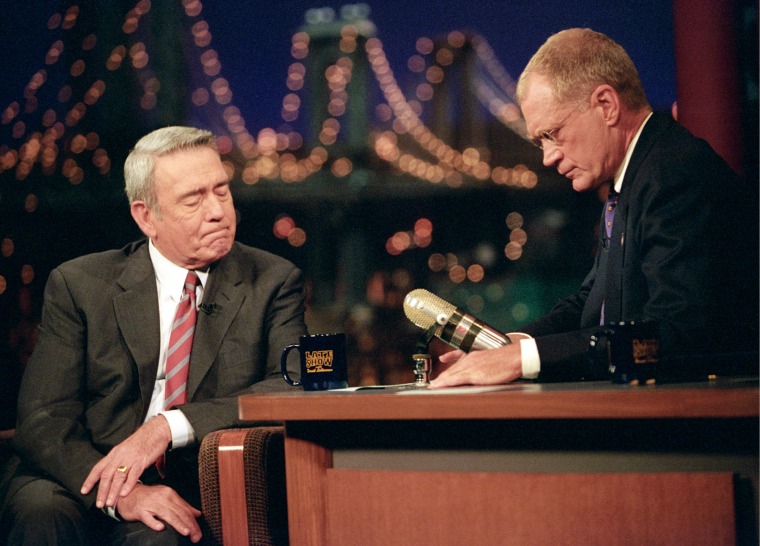
“In that moment, the desire to make fun of the world seemed like the last thing that held any meaning,” Smithberg told TODAY about watching the twin towers fall that day.
“The idea of going on TV and making a joke about anything just seemed gone,” she said about the days and weeks that followed.
Late-night shows went dark for several days when the networks shifted to round-the-clock coverage of the attacks. Eventually, though, the programs resumed production.
On Sept. 17, “The Late Show with David Letterman” became the first one to return to the airwaves. The usually irreverent Letterman, whose program taped in New York City, delivered words that night to viewers looking for anything to grasp.
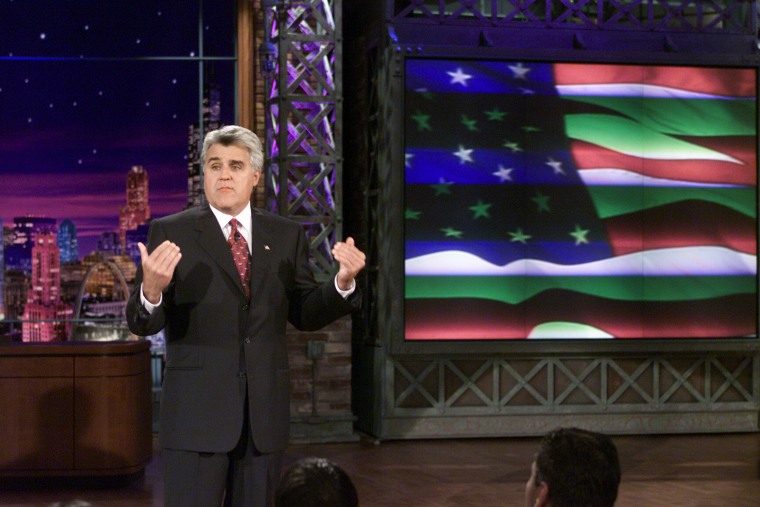
He gushed about then-New York City Mayor Rudy Giuliani, who was lauded for his handling of the attacks in the days and weeks afterward. Letterman skipped a monologue, electing instead to sit at his desk and speak directly to his fellow Americans.
“Another smaller group of people stole some airplanes and crashed them into buildings,” he said. “And we’re told that they were zealots fueled by religious fervor. Religious fervor. And if you live to be a thousand years old, will that make any sense to you? Will that make any goddamn sense?”
TV stalwart Regis Philbin, one of the most likable stars in the country and a frequent guest on Letterman’s show, was on that night, as was newsman Dan Rather, who fought back tears during his segment. Entertainment had given way to humanity.
Suddenly, comedy had become a way to cope.
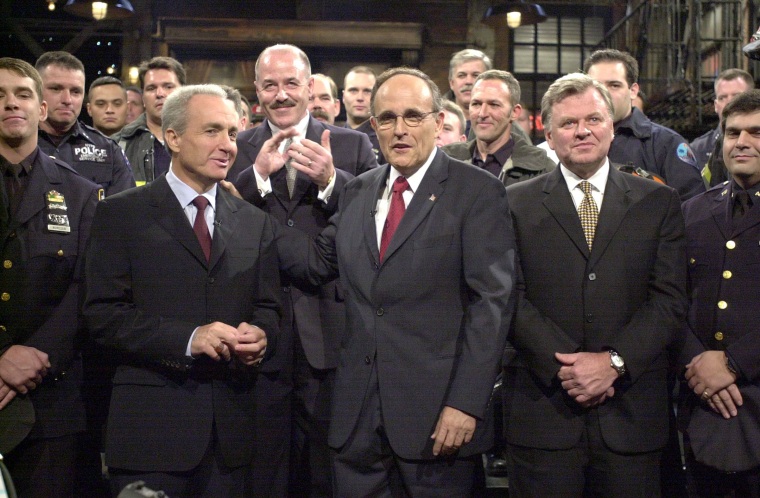
“I think that’s very scary,” Smithberg said while chuckling when discussing the notion of comedians acting as voices of comfort. “I think that when you live in a society where comedians are your most trusted public figures, you’re in trouble and somebody needs to do some adjusting. That’s not our job. Our job was to entertain you, make you think. We never wanted to be America’s therapists.”
That’s not to say Smithberg doesn’t understand, though. She says late-night hosts are a lot more cerebral than people may realize.
“I also think that late-night hosts are by definition intelligent, intelligent people,” she said. “They’re really, really smart and to spin topical subjects into comedy is actually a lot harder than it looks and feels.”
She says there’s no code that forbids them from speaking out and that has a real payoff.
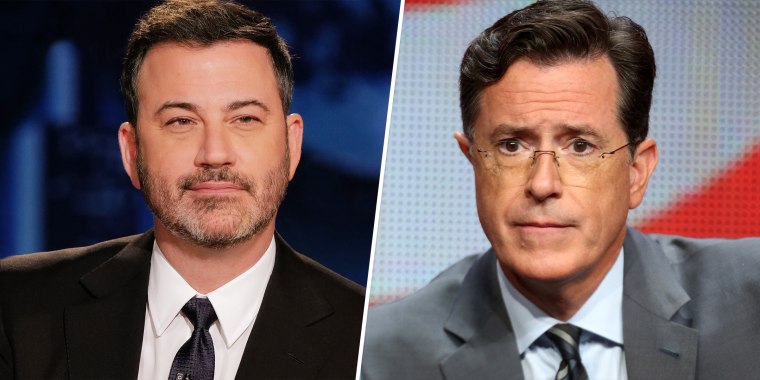
“They’re allowed to have opinions,” she said. “They don’t have to be impartial. And when they do stop trying to make you laugh and talk to you as an adult, with true emotion, it really does resonate because you think, ‘Oh my God, he’s not telling a joke. He’s speaking from his heart. I’m going to listen, because I trust this person.’ And I think that it really is powerful.”
“The Late Late Show with Craig Kilborn” followed Letterman that night, also eschewing its traditional fare in favor of chats with Lawrence O’Donnell, Dr. Drew Pinsky and Patricia Heaton.
“The Tonight Show with Jay Leno,” shot in Los Angeles, resumed the next night with Sen. John McCain.
"We have to be cautious and sensitive,’" Leno told The New York Times about the task of returning to work. "But at some point you want to get back and do the things that you do."
"Late Night with Conan O'Brien" followed Leno. He spoke with “60 Minutes” correspondent Steve Kroft and author Sarah Vowell.
"We’re going to move forward and try to make sense of our lives when nothing makes sense,” O'Brien told viewers.
In retrospect, it seems hard to believe, but Letterman's popular Top 10 list came back his second night, with “The top 10 things that almost rhyme with hat.” Leno also brought back his monologue the next night.
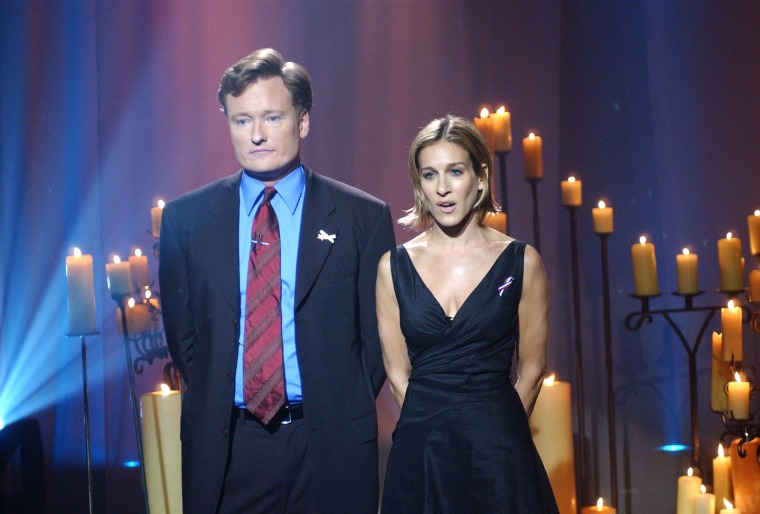
Jokes about President George W. Bush, whose penchant for mispronunciation was a staple of the pre-Sept. 11 late-night landscape, were off-limits as the nation rode a wave of patriotism.
“Subliminable’ is not a punchline anymore,” Jon Stewart said during his first show back as host of “The Daily Show” on Sept. 20. “One day it will become that again ... Lord willing, because it will mean we’ve ridden out the storm.”
“Saturday Night Live” was on hiatus at the time of the attacks, but returned for a new season Sept. 29. In a cold open, Giuliani and “SNL” executive producer Lorne Michaels appeared in a moment that signaled, maybe for the first time, it was safe to laugh again.
“Can we be funny?” Michaels asked.
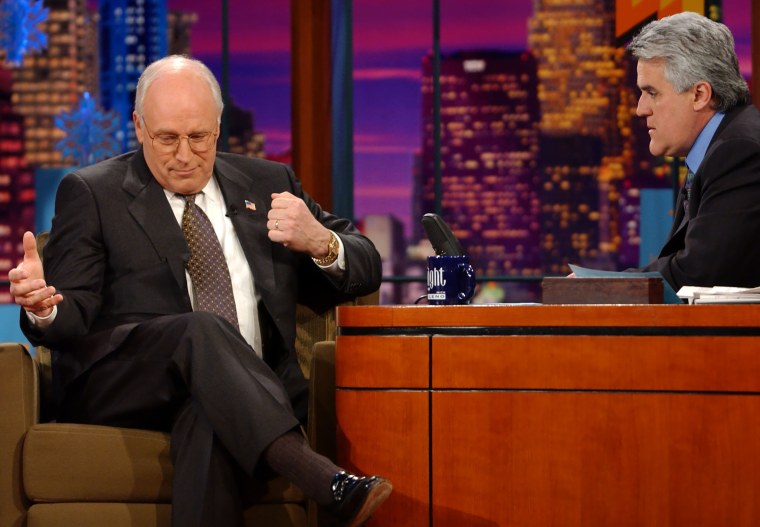
“Why start now?” replied Giuliani, drawing laughter.
ABC’s “Politically Incorrect” also returned Sept. 17, with an empty chair in honor of CNN commentator Barbara Olson, who was supposed to be a guest that week, but died on American Airlines Flight 77, which crashed into the Pentagon.
“Politically Incorrect” would be canceled and air its final episode in June 2002. Maher had generated controversy on his Sept. 17 episode with cutting comments.
“We have been the cowards, lobbing cruise missiles from 2,000 miles away,” Maher had said in response to a comment that the terrorists were not cowards. “That’s cowardly. Staying in the airplane when it hits the building, say what you want about it, it’s not cowardly.’’
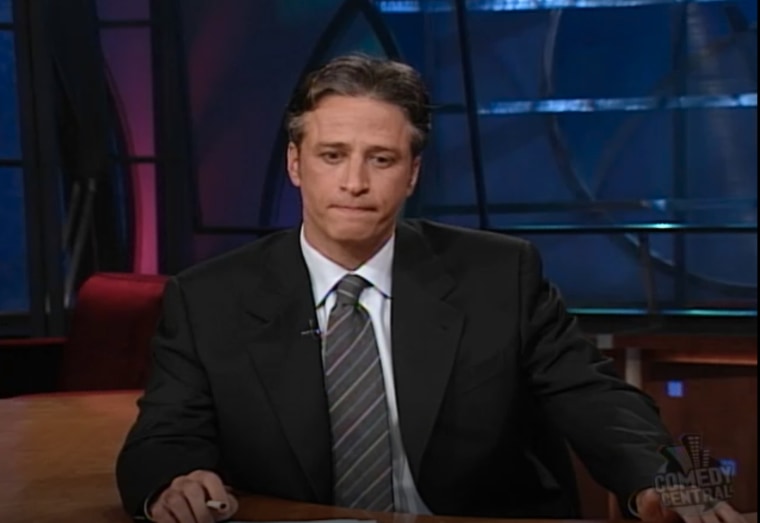
The voices of late-night shows developed into a beacon of hope and solace. They became a blueprint, a formula for how to handle tragedies that followed, as Leno and Letterman left their respective shows and the programming landscape shifted, with new hosts like Jimmy Fallon, Jimmy Kimmel, Stephen Colbert, Seth Meyers, James Corden and Trevor Noah taking over. They cackle jokes about the news of the day like we’ve grown accustomed to seeing, but also wax poetic when tragedy befalls the nation, from mass shootings to the coronavirus.
That ability to speak from the heart and be a person and not just an entertainer out to give some chuckles before viewers head to bed may have been born out of Sept. 11.
“After spending three decades in late night television, I found a tremendous amount of comfort in watching late night during the pandemic, because I felt like we’re all in this together,” Smithberg said. “I’m gonna see what these very smart and very funny people are saying and I’m going to use it to give myself an escape from my own experience.”
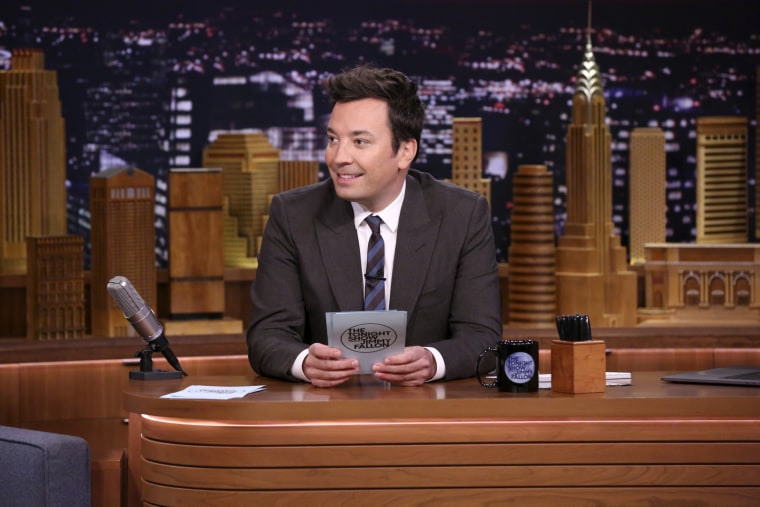
Fallon, who was a cast member on “Saturday Night Live” when the Sept. 11 attacks happened, put lessons learned from that to practical use in 2020 when he found himself hosting “The Tonight Show” from his own home in the early days of the pandemic, at a time when millions of Americans once again found themselves anxious, afraid and uncertain.
“'The show must go on' is kind of the thing that we learned back when I did ‘SNL,’” he told TODAY in March 2020. “I was thinking back, probably the last time I felt something like this was probably 9/11 and I was on ‘Saturday Night Live’ then and I looked to my late-night hosts, Jay Leno and Conan O’Brien and David Letterman, to see what they’re doing. I’m so happy that they were there for me.”
“I remember Letterman saying that it’s a time right now to be courageous and he said sometimes pretending to be courageous is just as good,” he continued. “And my wife reminded me of that quote. And so I said, ‘Yeah, we should do something. I have to do something.’”
“It’s very simple,” Letterman said during his first show back. “There is only one requirement for any of us and that is to be courageous because courage, as you might know, defines all other human behavior. And I believe, because I’ve done a little of this myself, pretending to be courageous is just as good as the real thing.”
Perhaps sensing a new kind of role for a late-night host, Stewart embraced the notion of how he would approach his hosting his duties in such a tumultuous time.
“I don’t see it as a burden. I see it as a privilege,” he said on his show that first night.
The late-night model may have shifted after Sept. 11, but it’s merely one of many ways our world was no longer the same.
“I think that it wasn’t just late-night television that changed. I think everyone changed and everything changed,” Smithberg said.
“Late-night television got changed, too, but no more than everything,” she added. “It was really like a before and after situation, and nothing would ever be the same. And there’s no reason that late-night television should be exempt from this transformational occurrence.”
